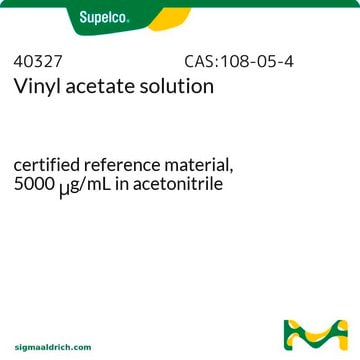8.08518
1-Vinyl-2-pyrrolidone
(stabilized with N,N′-di-sec-butyl-1,4-phenylenediamine) for synthesis
Sinónimos:
1-Vinyl-2-pyrrolidone, 1-Vinyl-2-pyrrolidinone
About This Item
Productos recomendados
vapor pressure
0.12 hPa ( 20 °C)
Quality Level
assay
≥98.0% (GC)
form
liquid
autoignition temp.
240 °C
potency
1022 mg/kg LD50, oral (Rat)
expl. lim.
1.4-10 % (v/v)
pH
9-10 (20 °C, 100 g/L in H2O)
mp
13-14 °C
transition temp
flash point 95 °C
solubility
soluble 52.1 g/L
density
1.04 g/cm3 at 20 °C
storage temp.
2-30°C
InChI
1S/C6H9NO/c1-2-7-5-3-4-6(7)8/h2H,1,3-5H2
Inchi Key
WHNWPMSKXPGLAX-UHFFFAOYSA-N
Application
- The Promising Potential of Gallium Based Liquid Metals for Energy Storage.: This review discusses the unique properties of Gallium-based liquid metals, including GaInSn alloys, for applications in energy storage systems. Their high conductivity and low viscosity make them ideal for use in flexible electronics and battery technologies (Rehman WU et al., 2024).
- Liquid Metal Encased in Biomimic Polydopamine Armor to Reinforce Photothermal Conversion and Photothermal Stability.: This study explores the encapsulation of GaInSn liquid metal in polydopamine to enhance photothermal conversion efficiency and stability, showing promise for applications in solar thermal energy and photothermal therapy (Wei W et al., 2024).
Analysis Note
Density (d 20 °C/ 4 °C): 1.043 - 1.044
Identity (IR): passes test
Due to its specific melting range the product may be solid, liquid, a solidified melt or a supercooled melt.
The material is stabilised N,N´di-sec-butyl-p-phenylendiamine. At time of analytical testing a content of >10 ppm stabiliser was determined.
signalword
Danger
Hazard Classifications
Acute Tox. 4 Dermal - Acute Tox. 4 Inhalation - Acute Tox. 4 Oral - Carc. 2 - Eye Dam. 1 - STOT RE 2 - STOT SE 3
target_organs
Respiratory system
Storage Class
10 - Combustible liquids
wgk_germany
WGK 1
flash_point_f
203.0 °F - closed cup
flash_point_c
95 °C - closed cup
Certificados de análisis (COA)
Busque Certificados de análisis (COA) introduciendo el número de lote del producto. Los números de lote se encuentran en la etiqueta del producto después de las palabras «Lot» o «Batch»
¿Ya tiene este producto?
Encuentre la documentación para los productos que ha comprado recientemente en la Biblioteca de documentos.
Los clientes también vieron
Nuestro equipo de científicos tiene experiencia en todas las áreas de investigación: Ciencias de la vida, Ciencia de los materiales, Síntesis química, Cromatografía, Analítica y muchas otras.
Póngase en contacto con el Servicio técnico











